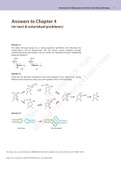CHEM180 (CHEM180)
British Columbia Institute of Technology (BCIT )
All 4 results
Sort by

-
Chem 128 – Introduction to Chemical Biology Mid-Term 2
- Exam (elaborations) • 5 pages • 2021
-
- CA$11.06
- + learn more
1(15 pts.) 1A. Fill in the blanks with the correct word or words below. From p. 143 in the textbook. With such a diverse portfolio of functions, random synthesis of different mRNAs would quickly prove disastrous for the cell. Instead, transcription by _RNA polymerase_______ is a tightly regulated event, dependent on the orchestration of __DNA sequences_________and__transcription factors________. Transcriptional regulation is driven by (1) ___growth OR cell division OR reproduction OR develop...

-
Introduction to Bioorganic Chemistry and Chemical Biology: Chapter 4 Answers
- Exam (elaborations) • 7 pages • 2021
-
- CA$18.44
- + learn more
Answer 4.1 The bulky tert-butyl group has a strong equatorial preference, the following two conformations will be predominant. The anti isomer cannot hydrolyze through neighboring group participation; the syn isomer can hydrolyze through neighboring group participation. OCH3 -O P O O :O- anti Introduction to Bioorganic Chemistry and Chemical Biology | A4096 OCH3 -O P O O.. -O Van Vranken & Weiss | 978-0-8153-4214-4 Answer 4.2 There are two plausible mechanisms that av...

-
Introduction to Bioorganic Chemistry and Chemical Biology: Chapter 7 answers
- Exam (elaborations) • 6 pages • 2021
-
- CA$18.44
- + learn more
Answer 7.4 Compounds with the strongest axial donor lone pair would exhibit the strongest preference for an axial or Group Answer 7.5 In lubiprostone, the CF2 group should favor the cyclic hemiketal relative to the parent compound with CH2 Answer 7.6 the trend of faster hydrolysis of α-glucopyranosides holds for a wide range of glycosidic derivatives. Oddly, methyl α-d-glycosides (such as gluco, galacto, and xylo) hydrolyze more slowly than the corresponding β-anomers. © design by t...

-
Introduction to Bioorganic Chemistry and Chemical Biology: ANSweRS To CHAPTeR 6
- Exam (elaborations) • 8 pages • 2021
-
- CA$25.83
- + learn more
Answer 6.1 Solve the equation. Convert temperature in °C to K by adding 273. Plug the numbers into ΔG = ΔH – TΔS. Kassociation = e–ΔG/RT. This is the equilibrium constant for association, so take the inverse: Kd = 1/Kassociation. Calculated using Kd = koff/kon: Answer 6.3 when the concentration of NADH is 3 × 10–7 M, the ratio of bound to unbound alcohol dehydrogenase is 1:1. From there, the ratio of bound to unbound enzyme can easily be estimated at other concentrations of N...

How did he do that? By selling his study resources on Stuvia. Try it yourself! Discover all about earning on Stuvia


